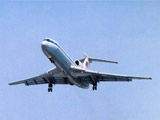|
|
TODAY.AZ / World news
Iran plans to build light airplanes, helicopters
02 March 2011 [16:00] - TODAY.AZ
 An agreement has been made with Defense Ministry to design and build light and super light airplanes that can carry two to 15 passengers as well as helicopters that can carry two to eight passengers, Deputy President for Science and Technology Gholam Hossein Rahimi said addressing the 10th conference on Iranian aerospace, Iran Daily reported with reference to Mehr News Agency.
An agreement has been made with Defense Ministry to design and build light and super light airplanes that can carry two to 15 passengers as well as helicopters that can carry two to eight passengers, Deputy President for Science and Technology Gholam Hossein Rahimi said addressing the 10th conference on Iranian aerospace, Iran Daily reported with reference to Mehr News Agency.Rahimi added at present tests have been carried out on fully composite Fajr-2 Airplane.
“Furthermore, researchers of the country have succeeded in designing and building super light composite airplanes which can carry four passengers,” he noted.
He emphasized on the private sector’s role in the development of the aviation sector and called it crucial to facilitate the presence of the private investors in the sector.
The official recalled the highest level of expansion in aerospace sector is defense applications while some 80% of the applications of aerospace sector pertains to the civil sector.
He referred to restrictions for using private airplanes in the country.
“Recently, a meeting was held at the presence of people involved in the aviation sector and they were requested to facilitate the needed legal grounds for using private airplanes in the country. This is while if necessary the needed permits for using other countries’ airspace should be obtained.”
Rahimi also pointed to Iran’s scientific growth compared to other regional countries. “Currently, Saudi Arabia has experienced a 43% growth in terms of publishing scientific articles. This is while Iran’s growth rate in this respect stands at 12%. In the meantime, Malaysia has had 34% growth rate, Egypt 12% and Pakistan also 12%,” he noted.
Late February president of Iran's Civil Aviation Organization Reza Nakhjavani announced 54 additional planes have joined the nation's civilian aircraft fleet over the past 17 months.
Nakhjavani noted 31 planes had been added to the country's aircraft fleet in the first ten months of the current Iranian calendar year (starting March 21, 2010).
Iran's Ministry of Road and Transport has announced that 18 of the country's newly incorporated aircraft are domestically registered wide-body planes. The ministry says 36 narrow-body planes were also added to the fleet, of which 14 are domestically registered.
Since the victory of the 1979 Islamic Revolution in Iran the United Sates has imposed sanctions against the country's civil aviation industry.
Based on US sanctions, international companies are banned from selling aircraft or the spare parts needed to maintain Iran's civilian air fleet to the country.
/Trend/
URL: http://www.today.az/news/regions/81734.html
 Print version
Print version
Views: 1710
Connect with us. Get latest news and updates.
See Also
- 26 December 2024 [18:45]
NASA unveiles the unique star cluster Cosmic Christmas tree - 26 December 2024 [18:04]
Nakhchivan Supreme Assembly approves 2025 budget and expenditure estimate - 26 December 2024 [08:30]
Sweden introduces new laws starting in 2025 - 26 December 2024 [08:00]
Next year, more than 1 million cars in Egypt will be powered by CNG - 25 December 2024 [23:30]
Number of 5G mobile users in China exceeds one billion - 25 December 2024 [21:27]
Japan allocates $2.1 billion to semiconductor manufacturers in 2025 - 25 December 2024 [19:45]
Taiwan detects the approach of three aircraft and six Chinese ships - 25 December 2024 [15:29]
Russia dispatches medical team to Aktau as Putin extends condolences during CIS Summit - 25 December 2024 [09:00]
Samsung Corporation reduces production of folding smartphones - 25 December 2024 [08:00]
South Korea and United States resume diplomatic activities
Most Popular
 Multiple-firing weapons: how India fooled Armenia
Multiple-firing weapons: how India fooled Armenia
 New Zealand rejects plan to introduce its own passports for residents of Cook Islands
New Zealand rejects plan to introduce its own passports for residents of Cook Islands
 Chairman of Israel-Azerbaijan Joint Economic Committee congratulates Azerbaijani President
Chairman of Israel-Azerbaijan Joint Economic Committee congratulates Azerbaijani President
 Armenian profligates and their Iranian friends gathered in an Azerbaijani mosque again
Armenian profligates and their Iranian friends gathered in an Azerbaijani mosque again
 Fountain Square transforms into winter fairy tale
Fountain Square transforms into winter fairy tale
 Azerbaijan condemns US administration of undermining bilateral relations
Azerbaijan condemns US administration of undermining bilateral relations
 US-Türkiye clash over Syria’s Kurdish dilemma deepens rift between allies
US-Türkiye clash over Syria’s Kurdish dilemma deepens rift between allies
